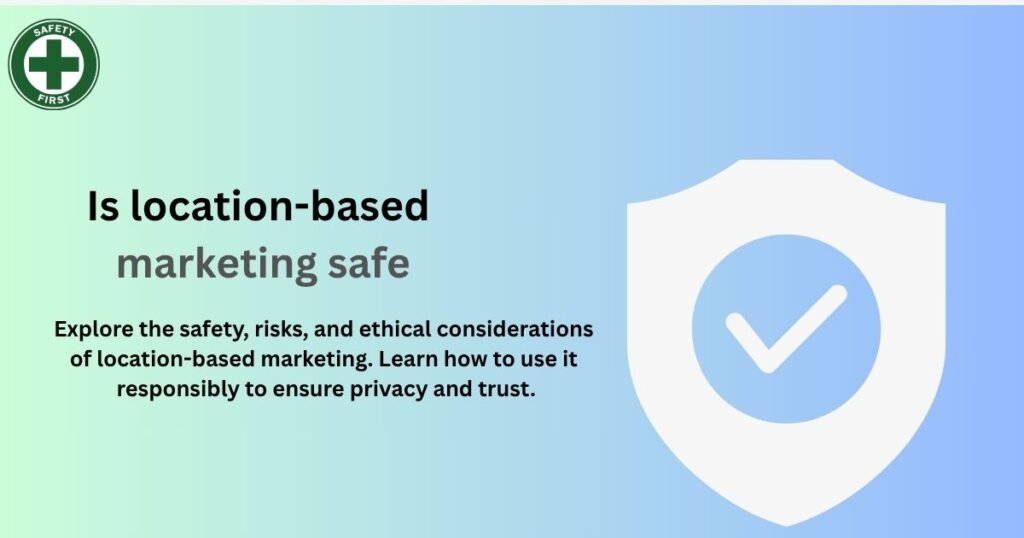Is Location Based Marketing Safe for Businesses and Consumers?

Place -based marketing has revolutionized how businesses connect to their customers. By distributing hypermiluted messages based on geographical data, it enables retail providers, restaurants and even online services that engage in engagement and sales. But there is great responsibility with great power. The question of many people’s brains is the site -based marketing security?
This blog explains security problems related to site -based marketing for both businesses and consumers, highlights potential losses and provides action -rich steps to ensure responsible use.
What is Location Based Marketing?
Before we address its safety, let’s establish a clear understanding of what location-based marketing actually is. It refers to the use of data about a user’s geographic location to deliver relevant advertisements or promotional content. This data can be collected through various technologies, including:
- GPS on smartphones
- Wi-Fi positioning
- Bluetooth beacons
- IP addresses
- Mobile apps with location permissions enabled
For instance, a coffee shop might use location-based marketing to offer a discount to users within a one-mile radius, or an e-commerce store may send push notifications as customers pass by a physical retail outlet. This hyper-localized approach not only improves marketing efficiency but also enhances customer experience.
The Popularity and Benefits of Location Based Marketing
Location-based marketing is powerful because it allows businesses to:
- Deliver personalized offers: Only show promotions to users who are in a position to act on them immediately. For example, someone passing by a clothing store may be tempted by a flash sale exclusive to nearby shoppers.
-
- Maximize ROI: By targeting specific locations rather than broader demographics, businesses can allocate their budgets more effectively.
- Improve analytics: Marketers can gain insights into customer foot traffic patterns, understand local demand, or track the effectiveness of specific location-based campaigns.
Unsurprisingly, this hyper-targeted approach is popular among industries such as hospitality, retail, and even healthcare. However, with this rise in adoption comes an increasing chorus of concerns regarding consumer privacy and security.
The Privacy Concerns of Location Based Marketing
The convenience of location-based marketing comes with a tradeoff. For the system to work, businesses must collect, process, and store location data. This data is highly personal and can expose sensitive details about a user’s lifestyle, habits, and preferences. Here are some specific privacy concerns you should be aware of:
1. Unauthorized Data Sharing
Many businesses collect location data without fully informing users about how that information will be used or who it will be shared with. This lack of transparency can lead to customers feeling their privacy has been violated, especially if their data ends up in the hands of third parties or is sold for profit.
2. Security Risks
When location data is improperly stored or inadequately protected, it becomes vulnerable to cyberattacks. A data breach leaking users’ locations could compromise their safety, expose their personal routines, or even lead to physical dangers in extreme cases.
3. Continuous Tracking
Apps that collect location data in real time often run in the background, collecting information 24/7. This can lead to users feeling like they are being surveilled, creating discomfort and often eroding trust in the business collecting the information.
4. Lack of Consent
Some users unknowingly enable location services on their devices or agree to terms and conditions without realizing they’ve given apps permission to access their location. When location-based marketing occurs without explicit user consent, it raises serious ethical concerns.
Best Practices for Safe and Ethical Location Based Marketing
For businesses asking themselves, “Is location-based marketing safe?” the answer depends on how you handle it. Implementing safety measures and ethical practices is crucial to maintaining trust while staying ahead of regulatory compliance. Follow these guidelines:
1. Use Transparent Data Collection Policies
Always inform users about how their data will be used. Include clear language in your privacy policies explaining why location data is being collected, who it will be shared with, and how long it will be stored.
2. Obtain Explicit Consent
Users should always have the choice to opt-in or opt-out of location tracking. Provide timely notifications when requesting access to location information, and avoid hiding permissions inside lengthy terms and conditions.
3. Limit Data Retention
Only store location data for as long as it is absolutely necessary. The longer sensitive data sits in your system, the greater the risk of a potential breach.
4. Invest in Data Security
Encrypting stored location data is a must. Invest in robust cybersecurity measures to ensure hackers cannot access your systems, and conduct regular audits to assess any vulnerabilities.
5. Respect User Anonymity
When using location data for marketing, aggregate the information rather than tying it to personal user profiles. Creating anonymous heatmaps rather than tracking individual users ensures privacy is preserved while still producing valuable insights.
6. Follow Regulatory Guidelines
Adhere to data protection laws, such as the General Data Protection Regulation (GDPR) in Europe or the California Consumer Privacy Act (CCPA) in the United States. These regulations are designed to protect user privacy, making them essential for any business using location-based marketing.
Safety Tips for Consumers
While businesses carry much of the responsibility, users also have a role in protecting their own privacy. Here’s how consumers can stay safe:
- Review App Permissions: Check regularly which apps have access to your location data and disable those you do not trust or need.
-
- Turn Off Location Sharing: Disable location sharing when not in use. For example, many smartphones allow you to turn off GPS for specific apps or entirely through system settings. – Read Privacy Policies: While tedious, understanding a company’s privacy policy can reveal how your data will be used and whether you want to proceed.
- Be Cautious of Public Wi-Fi: Avoid using apps that access sensitive or location-based data when connected to public Wi-Fi, as these networks are more vulnerable to hacks.
Turning Risks Into Rewards
Once made moral, the site -based marketing provides tremendous ability to make ads more relevant and attractive. For companies, it only opens one channel to contact users at the right time and gives the price when they sell. For consumers, it enables personal experiences that suit their immediate needs and preferences.
However, it is important to create a proper balance between privacy and privacy. User chairs, prioritization of data security and transparency businesses will undoubtedly stand out in an overloaded marketing scenario and enjoy long-term success.
Moving Forward With Confidence
The future is light for site -based marketing, but the success rests on the company’s willingness to prefer consumer privacy and security. By following best practices and adopting moral data policy, both businesses and consumers can unlock the benefits of this gaming marketing strategy without waiving the peace of mind.
Is interested in learning more about secure marketing practices? Expert advice to subscribe to our newsletter for weekly insights and benefit from the state -Art market equipment.





